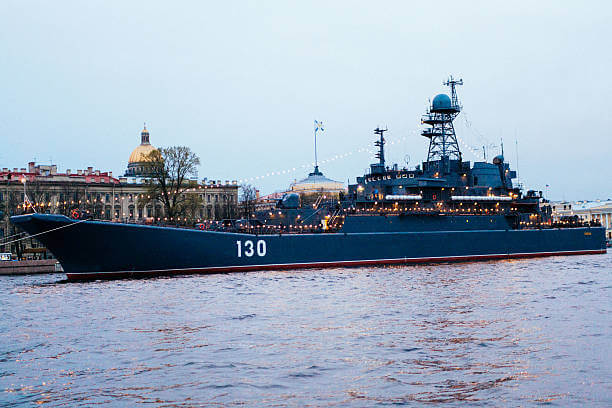On Friday, Denmark slammed Russia for not “respecting national borders” after a Russian naval vessel twice violated Danish territorial waters near the Bornholm island during the Democracy Festival of Denmark, where Prime Minister (PM) Mette Frederiksen and Minister for Foreign Affairs Jeppe Kofod were in attendance.
Et russisk militærfartøj har i nat to gange krænket dansk territorialfarvand
— Jeppe Kofod (@JeppeKofod) June 17, 2022
En dybt uansvarlig, grov og fuldstændig uacceptabel russisk provokation midt under #fmdk
Bøllemetoder virker ikke mod Danmark
Russiske ambassadør hasteindkaldt i Udenrigsministeriet#dkpol #WeAreNATO
Calling it “deeply irresponsible” and a “gross” provocation, Kofod asserted, “Let me be clear: bullying methods do not work against Denmark. We will not accept that kind of Russian provocation.” He also summoned the Russian Ambassador Vladimir Barbin to protest against this “completely unacceptable” action. However, the Russian Embassy in Denmark said in a statement that “no evidence” of the alleged crossing of the Danish maritime border by the Russian warship was presented.
In a statement, Danish Defense Command revealed that the Russian corvette “immediately left” the Danish waters north of Christiansø, which is 300 kilometres from the Russia-controlled Kaliningrad region, after it was contacted on the radio. Danish Minister of Defence Morten Bødskov confirmed that the Russian vessel was “no threat” to Denmark, noting, “We must accept that the Baltic Sea is an area with higher tensions than before.” He also informed that the Danish military is prepared “both on the water and in the air.”
Grov krænkelse! Rusland kender udemærket Danmarks grænser. Vigtigt: Ingen trusler mod Bornholm, #folkemoedet eller Danmark. Men vi må indstille os på, at Østersøen er et område med højere spændinger end tidligere. @forsvaretdk er tilstede - både på vandet og i luften #dkpol #fmdk https://t.co/QxaYY2x8CD
— Morten Bødskov (@mfMorten) June 17, 2022
“I think it is telling that while we in Denmark celebrate democracy, free speech and democracy at the People’s Assembly, Russia chooses to come forward with such provocations with military vessels. It speaks for itself,” Kofod remarked after Friday’s violation.
Denmark, which is a North Atlantic Treaty Organization (NATO) member, has supplied Ukraine with anti-tank launchers and an anti-ship missile system since Russia’s invasion on February 24. In this respect, Ukrainian Minister of Defence Oleksi Reznikov confirmed last month that Ukraine had begun receiving Harpoon missiles from Denmark. In fact, Kyiv revealed that Ukrainian forces had hit a Russian naval tugboat with two Harpoon missiles in the Black Sea on Friday, which was the first time that Ukraine claimed to have hit a Russian vessel with Western anti-ship weapons.
HARPOONED: The UKR navy has attacked the Russian naval tug Vasily Bekh near Snake Island. Video footage indicates the attack was likely made with HARPOON anti-ship missiles, supplied by Denmark. These capable missiles are changing the naval calculus in the Black Sea littoral. pic.twitter.com/FasMT4zmzt
— Chuck Pfarrer (@ChuckPfarrer) June 17, 2022
Last month, both Sweden and Denmark accused Russia of violating their airspaces, with Kofod calling it “particularly worrying.” Swedish Minister for Defence Peter Hultqvist, too, called the violation “totally unacceptable,” “unprofessional,” and “very inappropriate,” saying, “Swedish sovereignty must always be respected.”
Similarly, in March, four Russian fighter jets breached Swedish airspace when they flew over the Baltic Sea.
Russia's waterway violation against Denmark occurred near Bornholm in the Baltic Sea. Russia has previously expressed alarm about Denmark's solicitation of a US military presence in Bornholm, so the location is unsurprising pic.twitter.com/ci2ujOzTtY
— Samuel Ramani (@SamRamani2) June 17, 2022
Russia has been known to violate international airspaces over the Baltic Sea even before the Ukraine war. Last July, a press conference between Lithuanian President Gitanas Nauseda and Spanish PM Pedro Sánchez was interrupted when a pair of Spanish jets, stationed at the Siauliai NATO airbase, were scrambled to intercept two Russian Su-24 combat jets flying over the Baltic Sea from Russia’s Kaliningrad region unannounced, without “filing flight plans, without their transponders on, and without responding to regional air traffic control.” However, the Russian Defence Ministry said that the two jets “were flying a regular training mission” according to the international law on airspace and had not violated the borders of any country.
Earlier this month, Danish citizens voted to reverse the country’s opt-out from the European Union’s (EU) defence and security policy, which has been in place for the last 30 years, in a historic referendum prompted by the Ukraine war. Apart from scrapping the opt-out, the Danish government and main parliamentary parties also agreed to increase the country’s defence budget to match NATO’s spending goal—2% of GDP—by 2033. Their decision closely followed Sweden and Finland submitting applications to join NATO in a bid to increase their collective security.
A historic day! I have just informed our EU partners that Denmark will abolish the defence opt-out. Last step before we can participate from July 1st. We are ready to step up and take on more responsibility for European security 🇩🇰🇪🇺 #dkpol #eudk pic.twitter.com/hotNWTUQDp
— Jeppe Kofod (@JeppeKofod) June 20, 2022
Against this backdrop, Russian state-owned energy company Gazprom recently completely “suspended” natural gas delivery to Denmark for failing to make gas payments in rubles earlier this month in retaliation to the EU banning 75% of Russian oil imports as part of its sixth package of sanctions. Calling it a “breach of contract,” Danish energy company Ørsted said in a statement, “We have no legal obligation under the contract to do so, and we have repeatedly informed Gazprom Export that we will not do so.”
Ørsted also said that “it is possible” to purchase gas from the European market. According to the Danish energy Agency, 25% of Russian gas was consumed in the first 18 weeks of 2022, so the loss of supply would have no immediate consequences.

